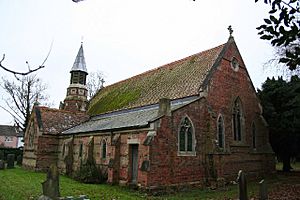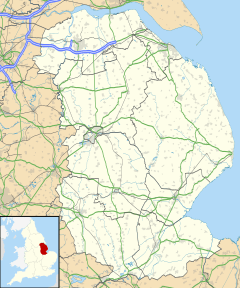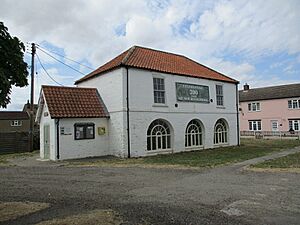New Bolingbroke facts for kids
Quick facts for kids New Bolingbroke |
|
|---|---|
 St Peter's Church, New Bolingbroke |
|
| OS grid reference | TF308580 |
| • London | 110 mi (180 km) S |
| Civil parish |
|
| District | |
| Shire county | |
| Region | |
| Country | England |
| Sovereign state | United Kingdom |
| Post town | Boston |
| Postcode district | PE22 |
| Police | Lincolnshire |
| Fire | Lincolnshire |
| Ambulance | East Midlands |
| EU Parliament | East Midlands |
| UK Parliament |
|
New Bolingbroke is a small village in Lincolnshire, England. It is part of the civil parish of Carrington and New Bolingbroke. You can find it in an area called the The Fens, which is known for its flat, low-lying land. The village is about 6 miles (10 km) east of Coningsby.
New Bolingbroke was started by a man named John Parkinson. He worked for a famous person called Sir Joseph Banks.
Contents
Exploring New Bolingbroke
New Bolingbroke has several interesting old buildings. These buildings tell us about the village's past. Many of them are "Grade II listed." This means they are special historic buildings. They are protected because they are important to England's history.
Historic Buildings and Places
The Town Hall's Story
The New Bolingbroke Town Hall was built in the 1820s. It is still called the Town Hall today. John Parkinson hoped New Bolingbroke would grow into a busy market town. That is why he gave it such a grand name. The Town Hall is a Grade II listed building.
St Peter's Church
The church in New Bolingbroke is named after St Peter. It was built in 1854. A famous architect named Samuel Sanders Teulon designed it. This church is also a Grade II listed building.
The Crescent: Homes and History
The Crescent is a curved row of buildings. It has red-brick shops and houses. John Parkinson built it in 1823. He wanted to house the workers from his weaving factory there. Today, all these houses are privately owned. The Crescent is also a Grade II listed building.
Windmills of the Past
New Bolingbroke once had two working windmills. Windmills use wind power to grind grain.
Rundles Mill
One of the windmills is called Rundles Mill. It was built in the mid-1800s. This mill is made of red brick. It is a tower mill, which means it has a tall, round base. Rundles Mill has not been used since at least 1906. It is a Grade II listed building.
Watkinsons Mill
The other windmill was Watkinsons Mill. It was built in 1821. This mill worked until 1944. That year, a part called the weather beam broke. It kept working for a while with an engine. But today, only the bottom part of the mill remains. It is now used as a storage space. Watkinsons Mill is also a Grade II listed building.
A Former Railway Stop
New Bolingbroke also used to have its own railway station. This station helped people travel to and from the village.
 | Dorothy Vaughan |
 | Charles Henry Turner |
 | Hildrus Poindexter |
 | Henry Cecil McBay |



